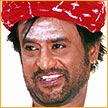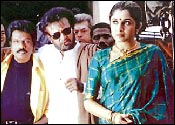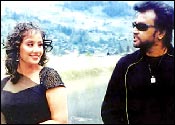
|
Who is at fault in Baba?
Why southern superstar Rajnikanth's film met with a dismal fate
|
Ira
When it comes to Rajnikanth, there is only one constant, and that is the buzz.
It begins when he announces a movie; it goes on through the making of the movie; it continues long after the movie has hit the marquee.
Baba, the southern superstar's first film in three years, is no exception.
The difference this time, though, is the nature of the buzz: where adulation was the norm, this time round hubris is the leitmotif.
Did Baba fail because it was released on an Ashtami day?
Was the demise of Swami Satchidananda a bad omen?
Is it the evil eye?
Did politics --- in the form of Pattali Makkal Katchchi leader Dr Ramadoss, whose followers boycotted the film in certain sections and actively prevented its run in some theatres --- play a part?
Or --- sacrilege --- was Rajnikanth himself responsible for his latest offering falling flat on its face? Increasingly, a section of public opinion is swinging towards the last view.
A Rajnikanth movie is not about surprises as much as hitting tried and tested emotive buttons --- as, indeed, was the case with the films of the late M G Ramachandran. Thus, the 'Rajni style' is mandatory. So too are the populist lines of dialogue: 'Tamil Nadu, which accepts outsiders with open arms', is one such: a reference to the fact that Rajnikanth is from Bangalore and is the number one icon in Tamil Nadu
Why then did Rajnikanth have to burden these people --- 'Tamil Nadu, that loves me' is another favourite line --- with crippling ticket prices? Baba tickets went, on the marquee, for the unusually high price of Rs 200 apiece. And his devoted legion of fans, who had patiently waited for three years for the swarthy superstar to return to the marquee, were flummoxed.

Why, the buzz goes, did he not, instead, aim for tax exemption and make his film affordable? Why did he try, instead, to increase prices even further?
An interesting parallel relates to a recent disaster by the other superstar Kamal Haasan. When he made the hugely budgeted, hugely hyped Aalavandhan (Abhay, in Hindi), he attempted to increase ticket rates --- but was turned down by All India Dravida Munnetra Kazhagam supremo Jayalalithaa.
When Rajnikanth, for Baba, wanted to increase ticket rates maverick journalist Cho Ramaswamy --- the man who was responsible for bringing Rajnikanth into the DMK umbrella in the mid-nineties, and causing the electoral debacle of Jayalalithaa's AIADMK then, interceded and Jayalalithaa permitted it.
For the AIADMK boss, Rajnikanth has always been a thorn in the political flesh. Hence, the fact that he was permitted to hike ticket rates is being viewed as an olive branch.
What gives the theory an added believability is the fact that Rajnikanth in return gave Jaya TV --- the private channel in which the TN chief minister has an interest --- 40 per cent of the advertisement rates.
Another negative was the fact that Rajnikanth hiked prices to unimaginable levels. For instance, the Telugu rights were priced at Rs 15 crore (Rs 150 million). Distributors in Andhra Pradesh were only prepared to go as high as Rs 9.5 crore (Rs 95 million), an offer Rajnikanth turned down, preferring instead to release it on his own.
The result: Baba fell flat on the AP marquee as well, with crowds diminishing by the second day of its run, and is now expected to earn Rs 1.5 crore (Rs 15 million) at best.
 An attempt to maximise revenue was responsible for his hiking the Theatre Fixed Hire to an unprecedented figure of Rs 30 lakh on average per print.
An attempt to maximise revenue was responsible for his hiking the Theatre Fixed Hire to an unprecedented figure of Rs 30 lakh on average per print.
Following the debacle of the film, theatre owners are now planning to plead with Rajnikanth to return over 70 per cent of their TFH, though they are aware that such a plea is not likely to find favor with the superstar's wife Lata, who handles the finances.
For some reason, the film appears to have been made with the express intention of making money. Thus, production costs were slashed to the bone; the film was budgeted at under Rs 7 crore (Rs 70 million), an unusually low sum for a film featuring any of the top heroes in Tamil today, let alone Rajnikanth. This frugality came at the expense of aesthetic values.
The film was then sold for Rs 70 crore (Rs 700 million).
If the points above are what the industry focuses on, the ordinary person looks at things from a more emotional perspective. From that point of view, the one point that keeps getting mentioned is the fact that following the death of Swami Satchidananda, Rajnikanth places ads for a Baba inset in the obituary.
There is one word for it: hubris.
A famous Rajnikanth lyric, penned by Vairamuthu, runs: "Kaiyil kollum kaasu irunthaal, nee thaan atharku mudalvan; Kazhuthu varaikum kaasu irunthaal, Panam thaan unakku mudalvan" Loosely translated: if you have enough money to hold in your hand, you are its master. If you have money up to your neck, it is your master.
Today, as a film meant to be a swansong becomes a millstone, the lyric sounds eerily autobiographical.